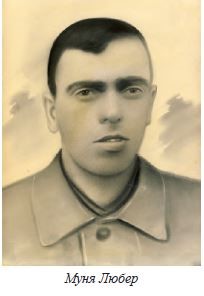
Munia Liuber, 1939
Munia Liuber (in his Red Army documents he was listed as Mikhail Liuber) was born in 1914 in Rîbniţa (Rybnitsa), a Moldavian town close to the border with Romania. In the late 1930s he provided for his family (wife and son born in 1939) by working at a lime quarry. The family lived in a mud-brick house that Munia had built with his own hands.
In July 1941 Rîbniţa was occupied by the Romanians and became part of their new province, Transnistria, and in August the Liubers became inmates of the Rîbniţa ghetto. In August 1942, a second son, Aleksandr, was born in the family. Relatives supported Munia's wife Nesia at this particularly dangerous juncture. A prewar Moldovan neighbor Olga took baby Aleksandr into her home during the most critical situations, such as raids of the Romanian police on the ghetto. Despite the danger, Munia succeeded in arranging for the circumcision of his newborn son.
In June 1943, with the consent of his wife, Munia fled from the ghetto, together with a group of young men who aspired to join Soviet anti-Nazi partisans. Nothing is known about their efforts except that they failed to find the partisans. They did succeed, however, in reaching to the front lines and crossing them, and thus, reaching an area controlled by the Red Army.
Mikhail Liuber was assigned to the 78th Rifle Division, that fought in Ukraine. Since he had spent two years in the enemy rear, Liuber was never promoted above the rank of private. He fought in Ukraine (participating in the liberation of Kharkov, Zhitomir, and Berdichev, among other places), then in Hungary and in Czechoslovakia. Private Mikhail Liuber was killed in January 1945 near the village of Sušany, in Slovakia.
His brother Iakov Liuber was born in 1905 in Rîbniţa. At the beginning of the Soviet-German war, he succeeded in evacuating his family eastward. A short time later, he was drafted into the Red Army. Despite his Moldovan origin, Iakov was included into one of the Siberian divisions (the 30th, later renamed the 55th) as a machine-gunner. With this division, he took part in the defense of Odessa, experienced the Red Army's retreat of 1941, and in 1942 and 1943 fought in the Northern Caucasus. Private Iakov Liuber was killed in September 1943 near the village of Krymskaia in the Northern Caucasus.






